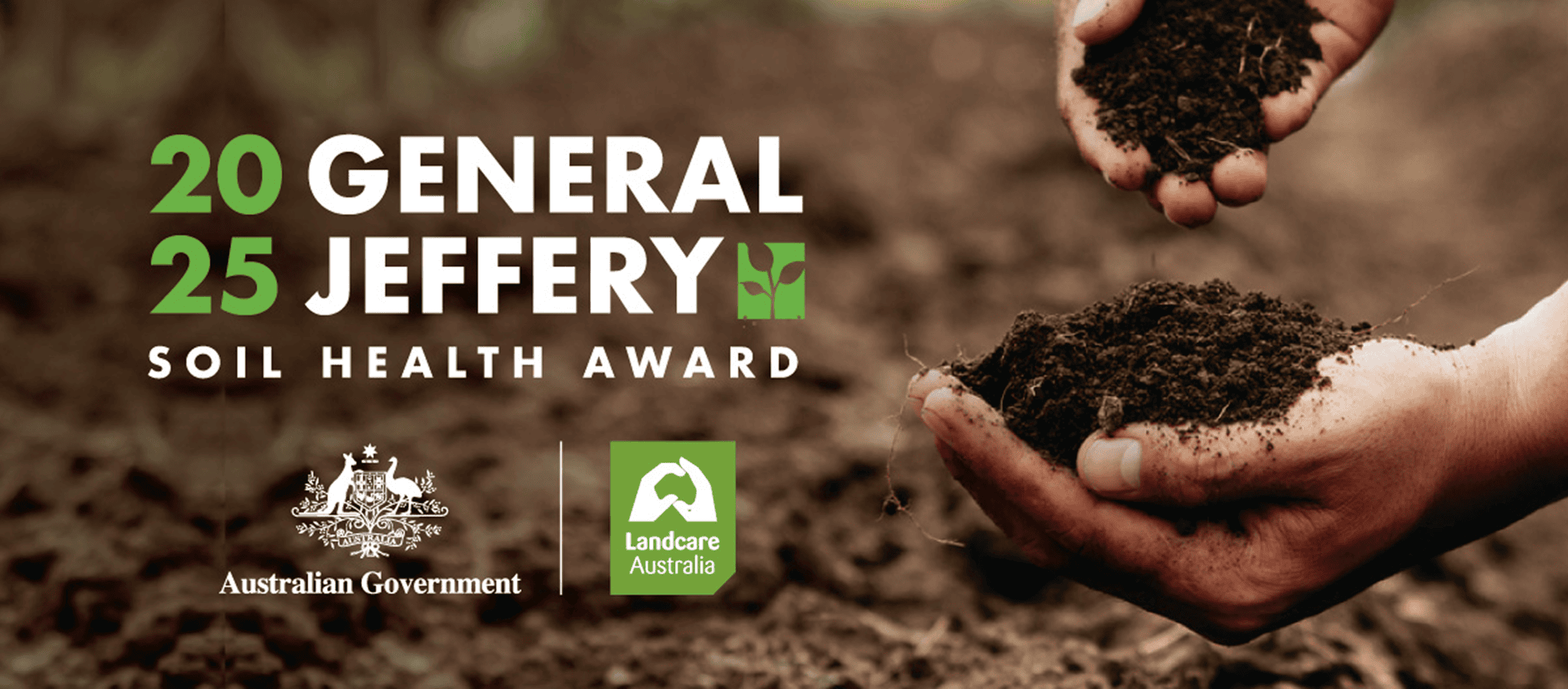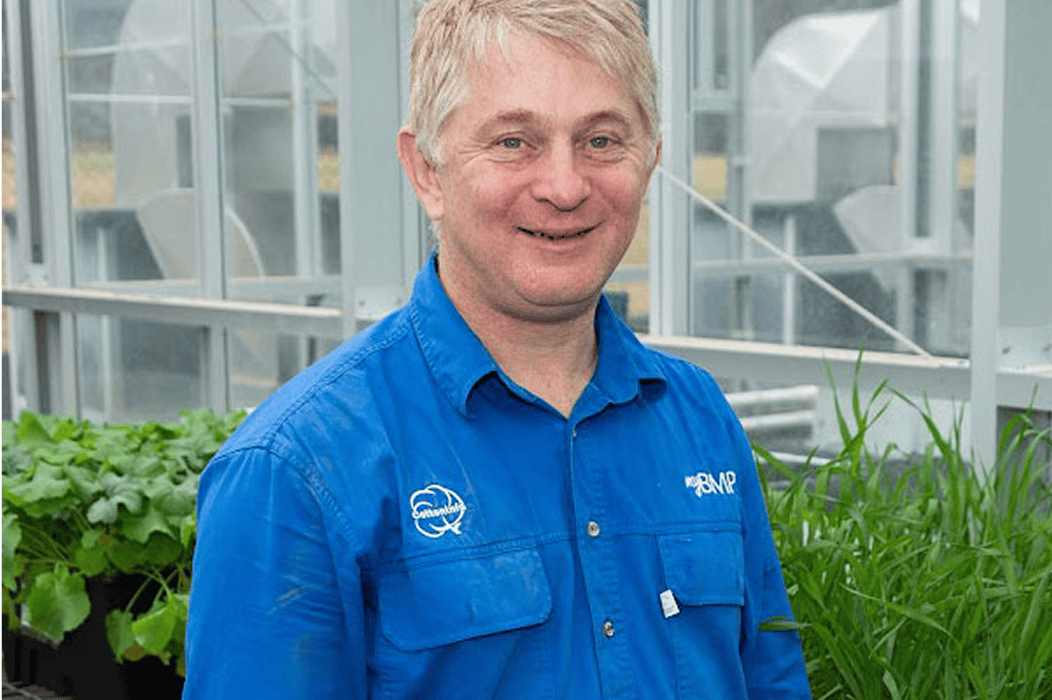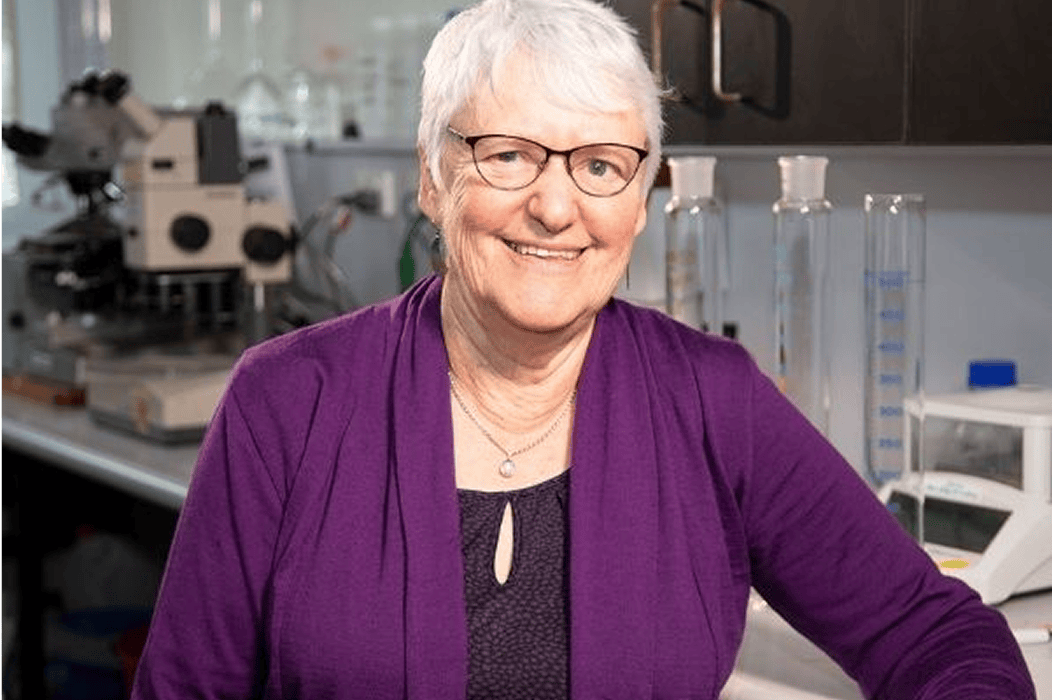2025 General Jeffery Soil Health Award

Nominations for the 2025 General Jeffrey Soil Health Award have closed for 2025.
The 2025 General Jeffrey Soil Health Award honours the remarkable work done by Australia’s first National Soils Advocate, former Governor General, Major General the Hon. Michael Jeffery, AC, AO (Mil), CVO, MC (Retd) and perpetuates his legacy.
As Australia’s first National Soils Advocate, General Jeffery passionately advocated for improvements in the health of our agricultural landscape. By championing soil health from Parliament House to the paddock, he successfully changed attitudes towards soil sustainability and energised change on farms right across Australia. He relentlessly pursued his focus on the importance of integrated management of soil, water, animals and plants to the benefit of all Australians and our environment.
Healthy, well managed soil is a vital part of the sustainability and productivity of our agricultural sector and the natural environment. Soils are the basis of food production, food security and human health, and this award acknowledges people who are working to protect, conserve and build the health of our soils.
The 2025 General Jeffery Soil Health Award recognises the work of people who care for soil health and who are educating or inspiring others. The Award will accept nominations from individuals, groups or organisations who are actively involved in activities to protect and improve soil health, including landcare groups, farmers, farming systems groups, land managers, extension specialists and educators.
Nominees must demonstrate leadership in natural resource management and a commitment to improving sustainable land management to improve soil health by:
actively shaping and guiding innovative natural resource management and sustainable agriculture activities to improve soil health
- applying excellent soil health management practices on–ground
- educating and raising awareness about the importance of maintaining and improving soil health
- encouraging action and championing the uptake of sustainable soil health practices
- communicating knowledge and advocating for soil health management
- mentoring and/or inspiring others to adopt best practice soil health management practices to restore, enhance and protect the natural environment.
All award nominations will be assessed by an independent Advisory Panel with an understanding and experience in soil health.
The 2025 General Jeffery Soil Health Award winner will be presented at the 2025 National Landcare Awards gala dinner. The Award winner will receive $20,000 (ex GST) in funding to complete an agreed soils project. The prize includes a travel package to attend the 2025 National Landcare Awards gala dinner for the award ceremony on Tuesday 23 September 2025 at the Gold Coast Convention and Exhibition Centre.
The 2025 General Jeffery Soil Health Award is funded by the Australian Government through the Natural Heritage Trust. Landcare Australia administers the Award on behalf of the Department of Agriculture, Fisheries and Forestry (DAFF). The General Jeffrey Soil Health Award was established in 2020 by the Office of the National Soils Advocate.
Key Dates
Nominations open Thursday, 5th December 2024 and close Monday, 31st March 2025.
Criteria
The 2025 General Jeffery Soil Health Award is open to individuals, groups or organisations who are actively involved in activities to protect and improve soil health, including landcare groups, farmers, farming systems groups, land managers, extension specialists and educators. Self-nominations are not eligible. Each nomination will be judged against the following criteria:
2025 General Jeffery Soil Health Award Criteria
Champions Soil Health
Write up to 300 words
- What has been done to develop and/or apply good land management practices that has resulted in quantifiable improvements in soil characteristics/soil health.
- What has been done to extend knowledge and champion improved soil health management, and what was the impact.
- What has been done to educate and/or raise awareness about the impact of maintaining and improving soil health.
Remarkable Leadership, Influence and Commitment
Write up to 300 words
- Describe how the nominee has been involved in sustainable land management and soil health at a regional or national level.
- Describe how the nominee has inspired others to make changes that quantifiably improve soil health and/or to become an advocate for changes in soil management.
- Describe how the nominee has demonstrated outstanding leadership and commitment to promoting soil health and soil sustainability.
- What has been done to inspire others (examples may include primary, secondary and tertiary educators) to be interested in soil health issues and influence their long-term thinking e.g. holding community meetings or workshops, webinars, field days, producing podcasts or videos and more).
- What impact has the nominee had in either the region where they operate in or at a national scale on soil health management practices and awareness. How have their efforts made a difference.
Inspires and Influence Others to Make a Change
Write up to 300 words
- How has the nominee encouraged and educated others with extension activities, communications outreach, education services and knowledge sharing.
- Describe how the nominee promotes both the need for and the benefits of soil health improvement activities. How does the nominee promote the results of these activities to a broad audience. For example, through blogs, social media, books, science media engagement, industry or environmental publications, webinars, high-profile or public events, meetings with influencers.
- How has the nominee been involved in developing, evaluating and promoting practical sustainable soil management beyond regional boundaries and through innovative means.
Effective Use of Prize Money
Write up to 300 words
- How will the nominee spend the $20,000 (ex GST) prize money to effectively extend their soil health work.
Eligibility
To be eligible, nominees must be actively involved in natural resource management, sustainable land management and agriculture, they must meet the following criteria:
- Individual nominee: An Australian citizen actively engaged in natural resource management or sustainable land management and agriculture to improve soil health.
- Group nominee: An Australian community-led group including landcare groups, landcare networks and farming systems groups.
- Organisation nominee: An Australian-owned, not-for-profit, non-government entity demonstrating leadership in natural resource management and sustainable agriculture, or in research.
- Research nominee: An Australian-owned tertiary institution who hosts a research team or academic specialising in soil health.
- Commitment: Demonstrated dedication to environmental stewardship and promoting sustainable practices to improve soil health.
- No self-nomination. Nominations can only be made by a third party.
FAQs
How do I nominate for the 2025 General Jeffery Soil Health Award?
Nominations are made via the Awards Force digital platform. Unfortunately, we can’t accept postal entries. Click to nominate.
When do nominations close?
Nominations will close on March 31, 2025.
How will award nominations be assessed?
All award nominations will be assessed by an independent Advisory Panel with an understanding and experience in soil health.
When will I hear about my nomination?
People who submit a nomination will be contacted in 2025.
Where and when will the award be presented?
The 2025 General Jefferey Soil Health Award will be presented at the 2025 National Landcare Awards gala dinner.
Why is the award named after General Jeffery?
The 2025 General Jeffrey Soil Health Award honours the remarkable work done by Australia’s first National Soils Advocate, former Governor General, Major General the Hon. Michael Jeffery, AC, AO (Mil), CVO, MC (Retd) and perpetuates his legacy.
As Australia’s first National Soils Advocate, General Jeffery passionately advocated for improvements in the health of our agricultural landscape. By championing soil health from Parliament House to the paddock, he successfully changed attitudes towards soil sustainability and energised change on farms right across Australia. He relentlessly pursued his focus on the importance of integrated management of soil, water, animals and plants to the benefit of all Australians and our environment.
How is the award funded?
The 2025 General Jeffery Soil Health Award is funded by the Australian Government through the Natural Heritage Trust. Landcare Australia administers the Award on behalf of the Department of Agriculture, Fisheries and Forestry (DAFF). The General Jeffrey Soil Health Award was established in 2020 by the Office of the National Soils Advocate.
For more information, please email us at [email protected]

